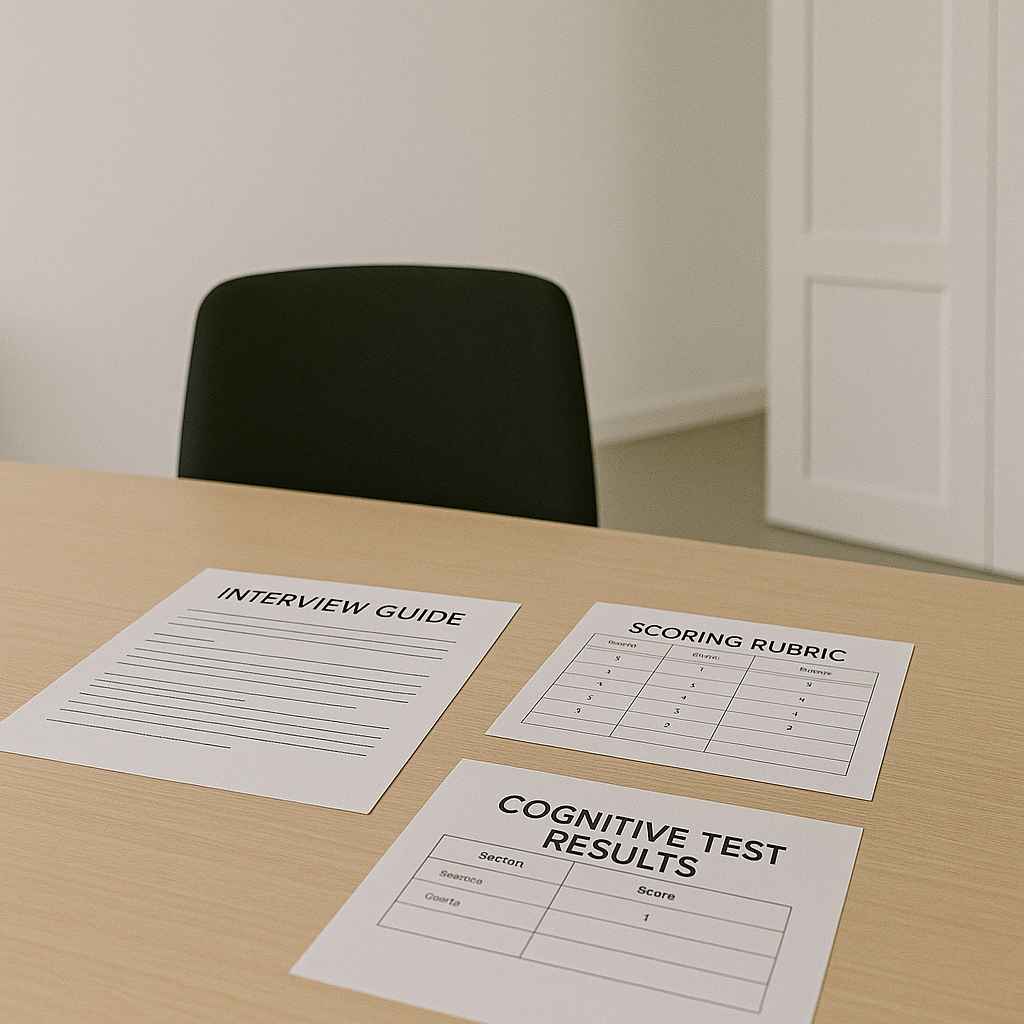Content
Let’s get straight to it: you’ve used a cognitive ability test—or plan to—but now you’re wondering, how do I follow it up? What questions bridge that test result with real-world job performance?
That’s what this guide is about. I’m breaking down the best cognitive assessment interview questions, why they work, and how to ask them naturally. You’ll walk away confident in your ability to combine data-driven insight with conversational interviewing that reveals how candidates think.
Why These Interview Questions Matter
A great cognitive test might tell you someone can think clearly, solve problems, or process complex information—but it doesn’t show how they apply those skills on the job.
That’s where interviewing comes in. The right questions help you:
- Bring test scores to life with real-world context
- Probe strengths and areas that numbers alone can’t explain
- Understand how someone communicates their thought process
- Assess adaptability, teamwork, and problem-solving style
These benefits are reinforced in research exploring the cognitive underpinnings of decision-making, where cognitive flexibility and executive function have been shown to play a major role in how people navigate uncertainty and make workplace decisions.
For full insight into the science behind cognitive assessments, explore the complete guide to cognitive ability tests.
Types of Questions That Work

We’ll cover three key styles:
- Think-aloud / Walkthrough
- Problem-solving with constraints
- Test validation and depth probe
These approaches often overlap with behavioral interviewing techniques. If you’re looking to expand beyond cognitive probes and structure your interview more comprehensively, here’s a great list of behavioral interview questions you can use to assess soft skills, decision-making patterns, and past behaviors.
Let’s unpack each.
1. Think-Aloud / Walkthrough Questions
These help you see how the candidate processes information. They explain their logic and reasoning.
Example Question:
“Can you walk me through how you arrived at your answer in the verbal reasoning section?”
- Why it works: Reveals clarity of thought, logical structure, and ability to communicate reasoning.
- What to look for: Coherent steps, confidence, and acknowledgment of complexity.
2. Problem-Solving Under Constraints

A short scenario tests analytic skills under real-world pressure.
Example Question:
“Imagine a key report is due in an hour, but you have incomplete data. What would you do?”
Scoring Table:
| Candidate Response | What It Reveals |
| Communicate clearly and adjust plan | Proactive communication + adaptability |
| Use assumptions with transparency | Creative thinking + honesty |
| Rush with no adjustments | Risk of incomplete or poor decision-making |
| Delay to wait for perfect data | Struggle with time-pressured environments |
3. Test Validation and Depth Probe
Questions that confirm and deepen insights from the assessment.
Example Question:
“We saw your numerical reasoning score was strong. Can you share a time you used data to change a decision or strategy?”
- Why it works: Connects test metrics to actual success drivers.
- What to listen for: Storytelling, results, impact, and measurement.
Tips for Conducting These Interviews

To make your process smooth and effective:
- Frame conversationally:
“I’d love to hear your thought process…” - Stay curious:
“Interesting—why did you choose that approach?” - Look for structure:
“What steps did you take first, and why?” - Use probing follow-ups:
“Was there anything you overlooked?” or “How did that shape your next step?” - Keep it fair:
Ask the same core questions for candidates in the same role.
Related Pages
- Learn what cognitive tests measure in What Is Cognitive Assessment? Meaning, Uses, and Examples
- Need sample test scenarios? Check out Cognitive Assessment Examples: Real Questions & Use Cases
- Explore various test platforms in Top Cognitive Assessment Tools for Hiring Success
- Want to screen faster? See Quick Cognitive Assessments: When & How to Use Them
- Learn to read score reports at Understanding Cognitive Assessment Scores: What Do They Mean?
- Searching for behavior insights? Check Cognitive Behavioral Assessment: What It Is & How It’s Used
- Compare cost vs. value at How Much Do Cognitive Assessments Cost? A Practical Overview
FAQ
Q: Should I use these interview questions with all roles?
A: They work best when you’re hiring for analytical, problem-solving, or learning-focused roles. For very tactical or task-based positions, soft-skill or culture-fit questions may be better.
Q: How long should this interview segment be?
A: 10–15 minutes is enough to gain meaningful insight without hogging the whole interview.
Q: Can we automate these follow-ups?
A: Not easily—these rely on natural dialogue. Use them within a structured yet conversational interview framework.
Final Thoughts
Pairing cognitive test scores with thoughtful interview questions is the secret to hiring success. You’re not just assessing ability—you’re understanding the person behind the number.
By using cognitive assessment interview questions like these, you’ll hire candidates who not only think well, but think well on your team.
👉 Ready to see how this works in your hiring flow?
Boost your process with a curated test and live discussion:
- Try our built-in Cognitive Ability test
- Or mix in domain-focused questions with Matrix Reasoning, Numerical Reasoning, and Verbal Reasoning
👉 Book a free demo and see how easy it is to combine tests and interviews for more confident hiring.
